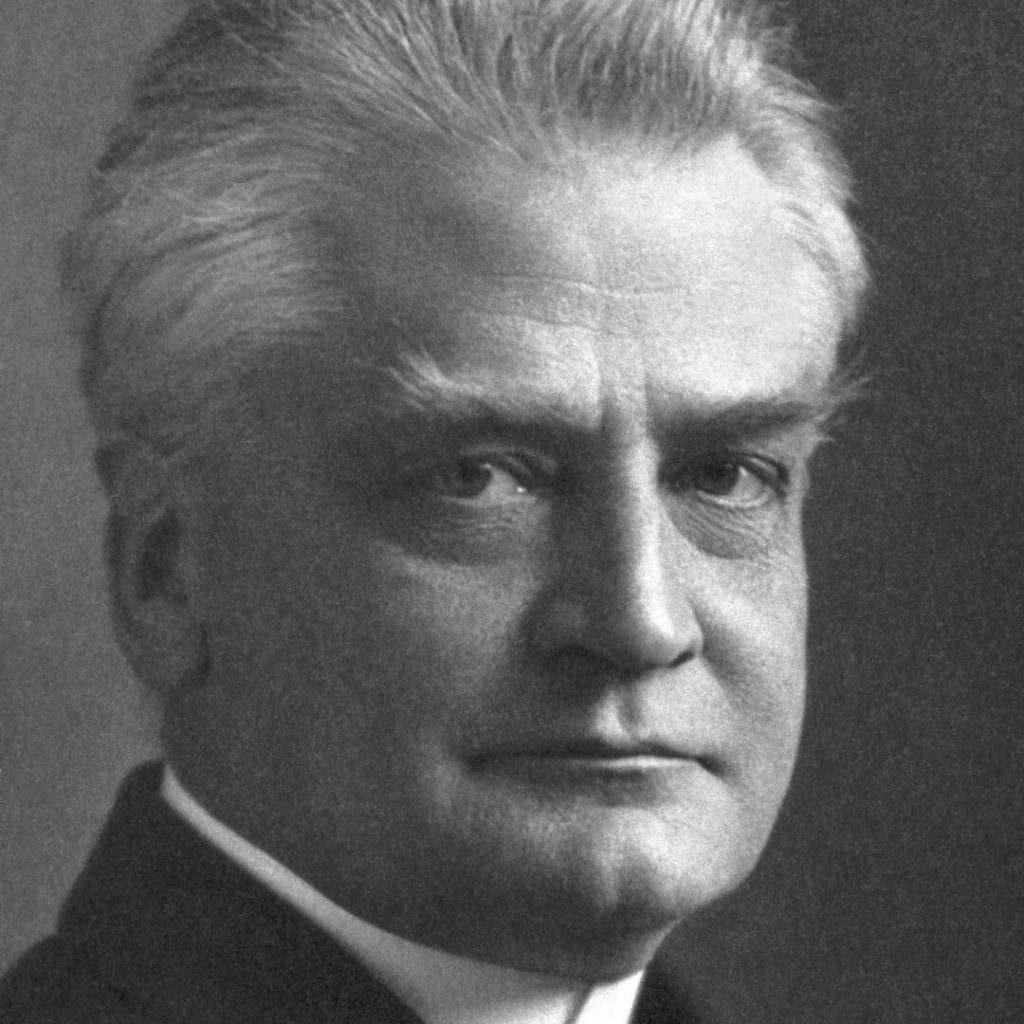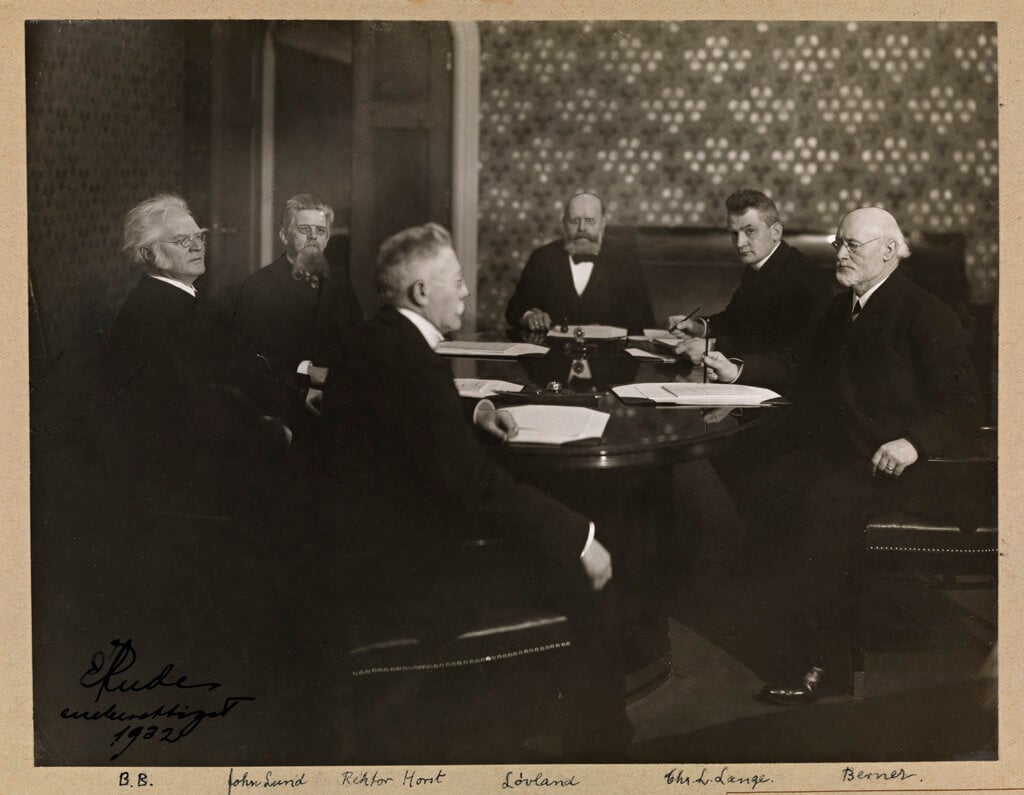Christian Lange
Speed read
Christian Lous Lange was awarded the Nobel Peace Prize, jointly with Karl Hjalmar Branting, for his lifelong contributions to the cause of peace and organised internationalism.

Full name: Christian Lous Lange
Born: 17 September 1869, Stavanger, Norway
Died: 11 December 1938, Oslo, Norway
Date awarded: 10 December 1921
Advocate of internationalism
In 1921 Christian Lange of Norway was awarded the peace prize for his efforts to promote international cooperation. Lange served as the first secretary of the Norwegian Nobel Committee and helped to build up the Nobel Institute in Oslo. He also participated in the political activities that culminated in 1905 in the dissolution of the union between Norway and Sweden. In 1909 Lange became secretary-general of the Inter-Parliamentary Union, which hosted conferences for parliamentarians from various countries, managing to keep the organisation intact throughout WWI. In 1920 Lange became a permanent Norwegian delegate to the League of Nations, and in the 1930s he cautioned against the aggressive policies of Japan, Italy and Germany. Lange was appointed a member of the Nobel Committee in 1934.
”Thus, a world federation, in which individual nations linked in groups can participate as members, is the political ideal of internationalism.”
Christian L. Lange, Nobel Prize lecture, 13 December 1921.
| Inter-Parliamentary Union Founded in 1889 to bring together representatives from various national assemblies for annual debates. Headquartered in Geneva. Works for the peaceful resolution of conflict between nations. Addresses topics such as disarmament, environmental protection, gender equality and current world conflicts. |
Lange and the dissolution of the union in 1905
In 1905 Norway withdrew from a union with Sweden that had lasted since 1814. Many Swedes viewed the move as an act of rebellion. Soon the countries were on the brink of war, but negotiations resulted in a peaceful solution. Chairman of the Norwegian Nobel Committee Jørgen Løvland was Norway’s minister of foreign affairs in 1905. During the conflict with Sweden, he employed the linguistically gifted secretary of the Nobel Institute, Christian Lange, to present Norwegian views abroad.
”... as Norwegians, we have some cause for pride in the fact that one of our fellow countrymen has done so well in the world …”
Member of the Nobel Committee Halvdan Koht, From the Norwegian newspaper 17. Mai, 12 December 1921.

Lange’s international efforts
Lange served as secretary general of the Inter-Parliamentary Union (IPU). At the outbreak of WWI the IPU headquarters were located in Belgium. When Germany invaded Belgium in 1914, Lange moved back to Norway and maintained contact with the parliamentarians from the warring countries for the duration of the conflict. In 1919 Lange moved the IPU headquarters to Geneva where the League of Nations was also located. Lange became one of Norway’s delegates to the League, where he spoke out against the dangers of fascism, Nazism and chauvinistic nationalism.
| Fascism Name of the bundle of rods symbolising the authority of the ancient Roman magistrates. Name of political party founded by Benito Mussolini in Italy in 1919. Fascists cultivated violence and despised democracy, believing that nations should have a ruling elite and a strong leader. |
| Nazi Party A byname for the Nationalsozialistische Deutsche-Arbeiterpartei (National Socialist German Workers’ Party). Followers of Adolf Hitler’s policies and philosophy. A nation’s citizens should obey a strong leader and the Aryan race was superior to all others. |
| Chauvinism Extreme nationalism that claims people of one particular nationality are superior to all others. In its most extreme form, chauvinism results in racism. |
Lange as Nobel Committee member
Christian Lange served as the first secretary of the Norwegian Nobel Committee. After stepping down from this post, he served as adviser to the committee for many years, compiling reports for the Nobel Committee on the nominated candidates. Appointed as a member of the Nobel Committee in 1934, Lange participated in the dramatic events surrounding the 1935 Nobel Peace Prize award to German pacifist Carl von Ossietzky, who was imprisoned in one of Hitler’s concentration camps. The award made Hitler so furious that he banned all Germans from accepting any Nobel Prizes in the future.
”The heroes of peace are not named to the ranks by their success in building an everlasting peace, but by their tireless exertions as ‘faithful guardians of the highest interests of mankind’... Such a hero was Christian Lange.”
Professor Irwin Abrams in Karl Holl/Anne C. Kjelling: The Nobel Peace Prize and the Laureates, page 176, Peter Lang 1994.
Learn more
In the first third of the twentieth century, Christian Lous Lange became one of the world’s foremost exponents of the theory and practice of internationalism …
Disclaimer: Every effort has been made by the publisher to credit organisations and individuals with regard to the supply of photographs. Please notify the publishers regarding corrections.
Nobel Prizes and laureates
Six prizes were awarded for achievements that have conferred the greatest benefit to humankind. The 14 laureates' work and discoveries range from quantum tunnelling to promoting democratic rights.
See them all presented here.
